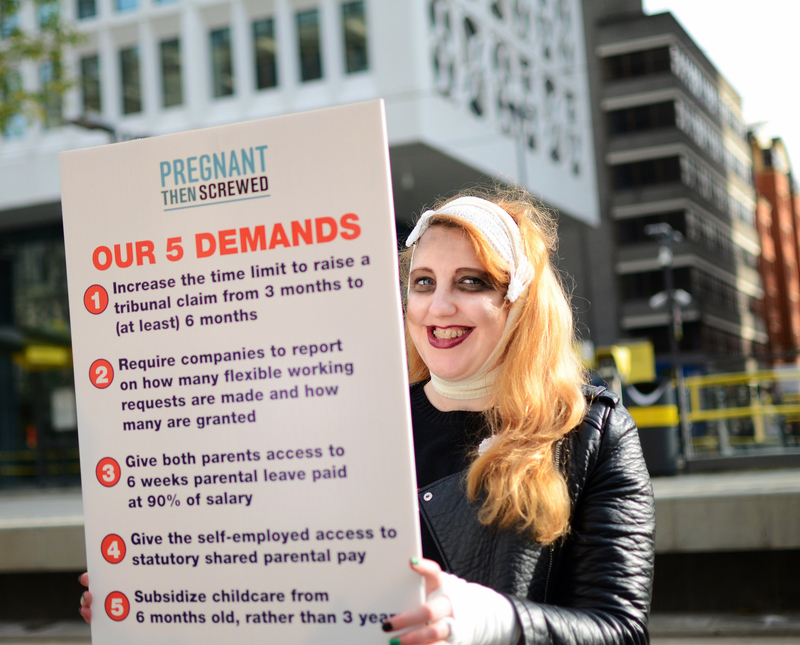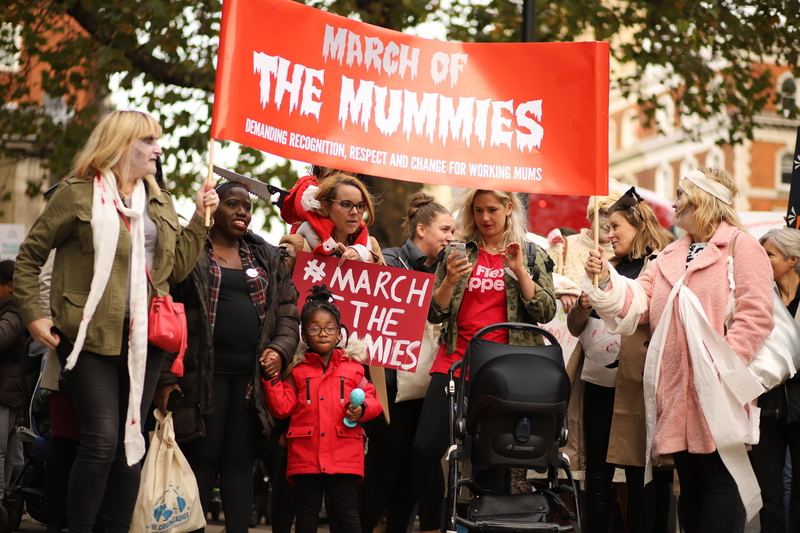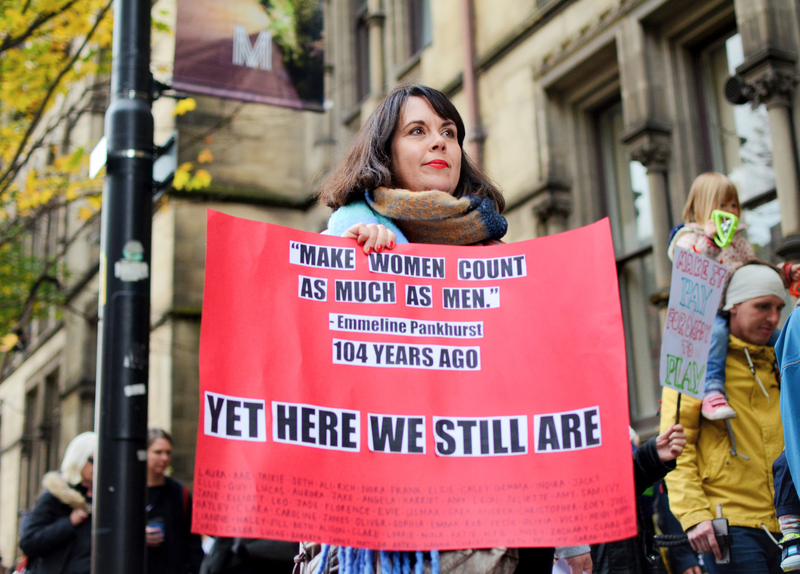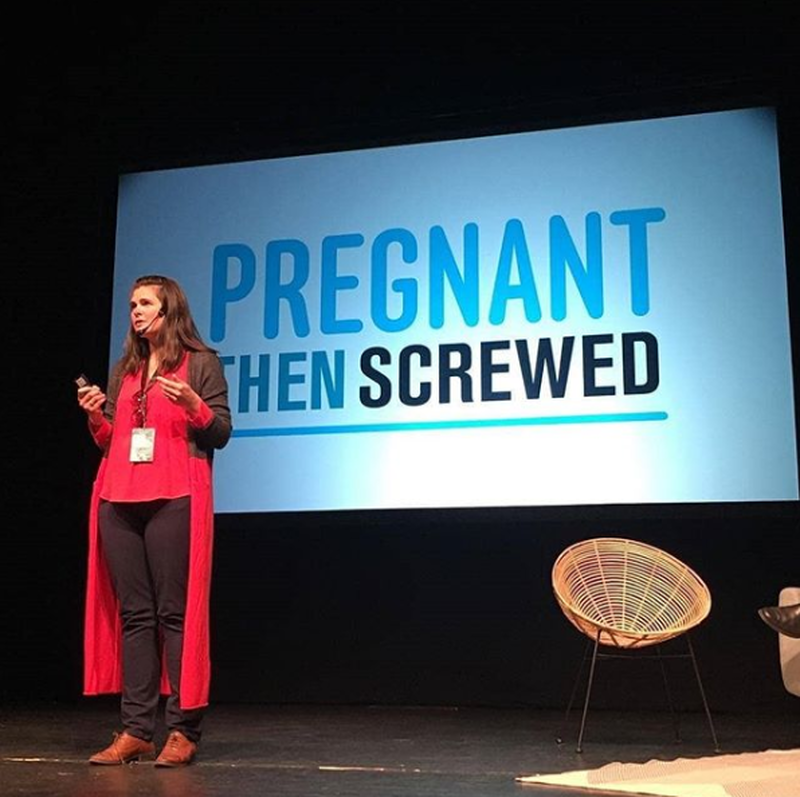"The government won't end pregnancy discrimination so I will," says campaigner Joeli Brearley
There are many ways to respond to the news of a pregnancy. Throw a party, send flowers or at the very least, congratulate the mum-to-be.
But for campaigner Joeli Brearley, the announcement of her new arrival resulted in a swift dismissal from her employer via voicemail.
“It was utterly terrifying – I was four months pregnant with a mortgage to pay and was unemployed.”
After costly legal fees and warnings from her doctor that stress could have a dangerous effect on her pregnancy, Brearley was forced to drop the case.
“The law doesn’t really protect women properly.”
“It was only when I met other mums at groups that I realised this was happening to other women. Not quite like my case – mine was quite extreme – but women being demoted, made redundant or bullied out of their jobs just because they dared to procreate.”
"Women are silenced by this situation. If they speak out, they’re branded a troublemaker or forced to sign a non-disclosure agreement which is basically like a gagging order that prevents them from speaking out."
So, Brearley founded Pregnant Then Screwed in 2015, an anonymous website to document cases of pregnancy discrimination. The international site now holds over 3,000 records.

It is estimated that around 54,000 new mothers are losing their jobs every yer, according to a 2015 government-funded study by the Equality and Human Rights Commission (EHRC). The number is almost twice that of a similar report conducted in 2005. The study also revealed that 77% of working mums encounter negative or discriminatory treatment in the workplace
It is not just working mums that are losing out - experts estimate that this loss of work costs UK business £280m a year. And it is a key contributor to the gender pay gap, preventing women from progressing in their careers.
“Those statistics are shocking,” comments Brearley. “People think the problem is getting better but it’s not, it’s worsening.”

Only 0.6% of women that experience pregnancy discrimination raise a tribunal.
“The law doesn’t really protect women properly.”
“Firstly, there’s the three-month time limit for raising a tribunal, which is prohibiting. You don’t know how to navigate the legal system and you’ve either just had a baby or are due very soon, which is life-changing. In my experience it can take three to six months to fully understand what has happened to you.
“Then there’s the cost. You’re only on £140 per week maternity pay, so often you can’t afford legal fees.
“It’s also hard to prove pregnancy discrimination. Employers know that it’s against the law to just get rid of you, so often things are subtle.”
To make the process easier, Pregnant Then Screwed offers a mentor scheme that pairs up a woman who has just started the tribunal process with someone who has already completed it.

“The government commissioned this piece of research into pregnancy discrimination, and yet are doing nothing to stop this since the report came out,” Brearley continues. “So, we’re working with businesses directly to tackle the issue.”
Brearley is leading a movement to end pregnancy and maternity discrimination in Greater Manchester. The region is the first in the UK to make such a pledge and is backed by Mayor of Greater Manchester Andy Burnham. So far, 65 business have signed up.
“Many businesses may feel that this is not their priority. So, part of our job is to make businesses realise the benefits of our work. [Retaining working mums and offering flexible working] is good for business; it generates profit, increases productivity and lets you make the most of the talent pool.”
A HSBC report said 89% of their staff are more productive when flexible or remote working is implemented.
Brearley plans to offer workshops with HR and legal advisors to help businesses implement structures that better facilitate working parents. Case studies from businesses that the movement has partnered with will also highlight any pitfalls.

The gender pay gap widens consistently for 12 years after a woman's first child is born, by which point women receive 33% less pay an hour than men, according to the Institute for Fiscal Studies.
Although shared parental leave was introduced in 2015, the uptake was less than 2%. Brearley believes that a stronger initiative is needed to break the stereotype of childcare as a women’s concern.
“It [shared parental leave] was a step in the right direction, but it’s fundamentally flawed,” explains Brearley. “Women have to give away part of their leave to men, which they don’t want to do. And often fathers aren’t paid. Other countries have reported that uptake for shared parental leave is far better when the father has ringfenced leave (meaning that part of the leave is reserved for the father and mother separately). We’re never going to overcome deeply entrenched gender stereotypes that say that childcare is un-manly without a strong incentive for fathers to share leave. We need to financially incentivise fathers to take leave and offer a use it or lose it approach. That’s the way we’ll fix the gender pay gap.”
“The UK childcare system is the most expensive system in the world for middle-earning families. So, often women have to weigh up whether it is worth them returning back to work when they have to pay these childcare costs. But they don’t realise that the break they have will affect their working life in the future.
“Part time and flexible positions are often low skilled and low paid, resulting in many highly skilled women working in roles they’re massively overqualified for. Childcare is subsidised when children turn three – but by then the break from work has already had a significant impact to their earning potential. By the time retirement comes, women have a third of what men have in their pensions. Women need to think about the long-term.”

Offering flexible and part time working hours that can fit around parental duties will also encourage the retention of working mums, Brearley believes.
“In the past directors have said that because they managed to work from 6.00am – 8.00pm every day and build their company up, then their employees should do that too. But these types of business people are like dinosaurs that will die out. Millennials are just not going to stand for this rigid approach to work.”
PageGroup’s latest trends research revealed that more than half (59%) of Generation FL-X expect flexible working to be offered by all employers, to all employees, as standard – rather than being seen as a benefit or perk for a select few. Almost 8 in 10 (79%) also felt that the ability to work flexibly will be a fairly or very important consideration for them by 2020.
Greater Manchester's pledge to end pregnancy and maternity discrimination is long overdue and, if committed to, will have a significant impact on the Greater Manchester region.
“It will reduce the number of families in poverty because the mums can’t go back to work. It’ll improve companies’ bottom line. It’ll improve productivity.
"It will make Greater Manchester the best city region for working families in the country.”
Working Forward Greater Manchester is coordinated by the Equality and Human Rights Commission (EHRC) and the Motherhood Plan Community Interest Company.
For more information on Pregnant Then Screwed, visit the website




